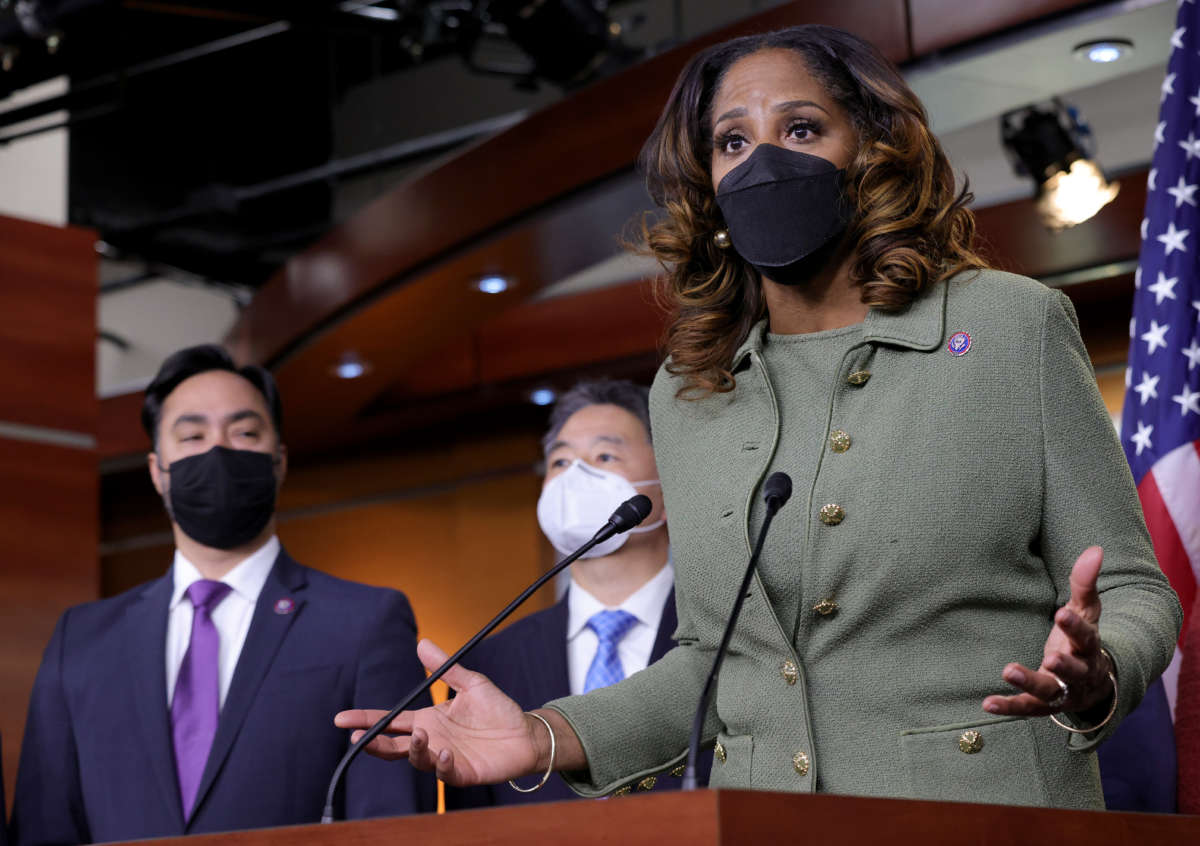Impeachment manager Delegate Stacey Plaskett of the U.S. Virgin Islands said on Monday that Republican senators have privately approached her about the impeachment trial and said that the managers made a convincing case for conviction, but they were voting to acquit anyway.
Plaskett, speaking to Chris Cuomo on CNN said, “I had senators even after we presented who stopped me in the hallway — Republicans — who said that we had made the case but yet they were going to vote to acquit the president.”
On Saturday, the Senate voted to acquit Donald Trump for the second time in just over a year. Fifty seven senators voted guilty, including seven Republicans, which is not enough to reach the two-thirds majority threshold for conviction. Only one Republican, Richard Burr (R-North Carolina), joined the six Republicans who last week had voted that the trial was constitutional in voting to convict.
The GOP senators, Plaskett said, were afraid of standing alone if they voted to convict. She says that she would ask, “Well, why don’t you vote to convict in first instance, and not vote to disqualify him [from running for office again], which only requires a majority?”
And the Republican lawmaker would say, “Well, I don’t think you’ll get to 17, so I’ll never get to that second disqualification vote, and I don’t want to stand out on a limb by myself.”
As cover, many Republicans cited the fact that they think the trial was unconstitutional or otherwise wrong because Trump is no longer president. The decision to delay impeachment until after inauguration was a largely bipartisan decision since the House impeached him only a week before Joe Biden officially took office. Some Democrats had wanted to start the trial right away, while Trump was still in office, but Republicans like Mitch McConnell (R-Kentucky) had objected to it.
The sentiment expressed by Senate Republicans that they didn’t want to vote to convict because they didn’t want to stand on their own — though they would have been joining at least a small cohort of Republicans, which is clear now — is similar to that of House Republicans back when the House voted on impeachment in January.
Back then, so shortly after the attack on the Capitol on January 6, GOP representatives were saying in private that they didn’t want to vote to impeach Trump out of fear — they were getting death threats, they said. That led media outlets like Vox to say that the attack on January 6 by Trump militants was a success in that they made politicians scared to do their jobs, and scared of betraying Trump.
Over the weekend, Plaskett also defended the Democrats’ decision to not call witnesses for the trial after the Senate had voted to allow it. In a different segment on CNN, she said “we didn’t need more witnesses, we needed more senators with spines.”
Plaskett also emphasized that the Republicans who voted against conviction represent a minority of the American population.
“Remember that we had 57 senators who voted to convict the president, and those 57 senators represent even more than the 57 percent of the population of this country. Those states that they represent are much broader than a 57 percent coalition,” Plaskett said. “Those 43 individuals who believe that their party and the president were more important than their oath, who believe that a seat in the Senate was more important than their constitutional duty, I think represent a much smaller number of Americans.”
The impeachment trial and surrounding Republican statements show that the party is still largely loyal to Trump — or at least his base — many have said. Even the few GOP senators who voted to convict are facing censures by their local Republican parties, indicating that the party is not willing to give up Trump.
Join us in defending the truth before it’s too late
The future of independent journalism is uncertain, and the consequences of losing it are too grave to ignore. To ensure Truthout remains safe, strong, and free, we need to raise $43,000 in the next 6 days. Every dollar raised goes directly toward the costs of producing news you can trust.
Please give what you can — because by supporting us with a tax-deductible donation, you’re not just preserving a source of news, you’re helping to safeguard what’s left of our democracy.
